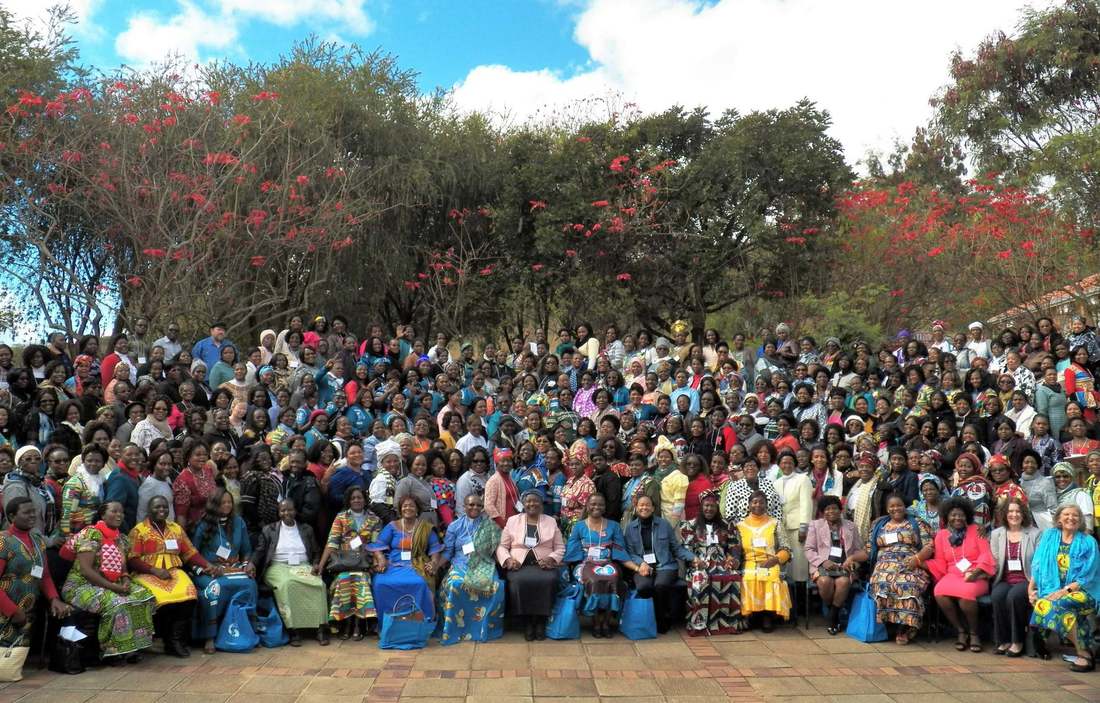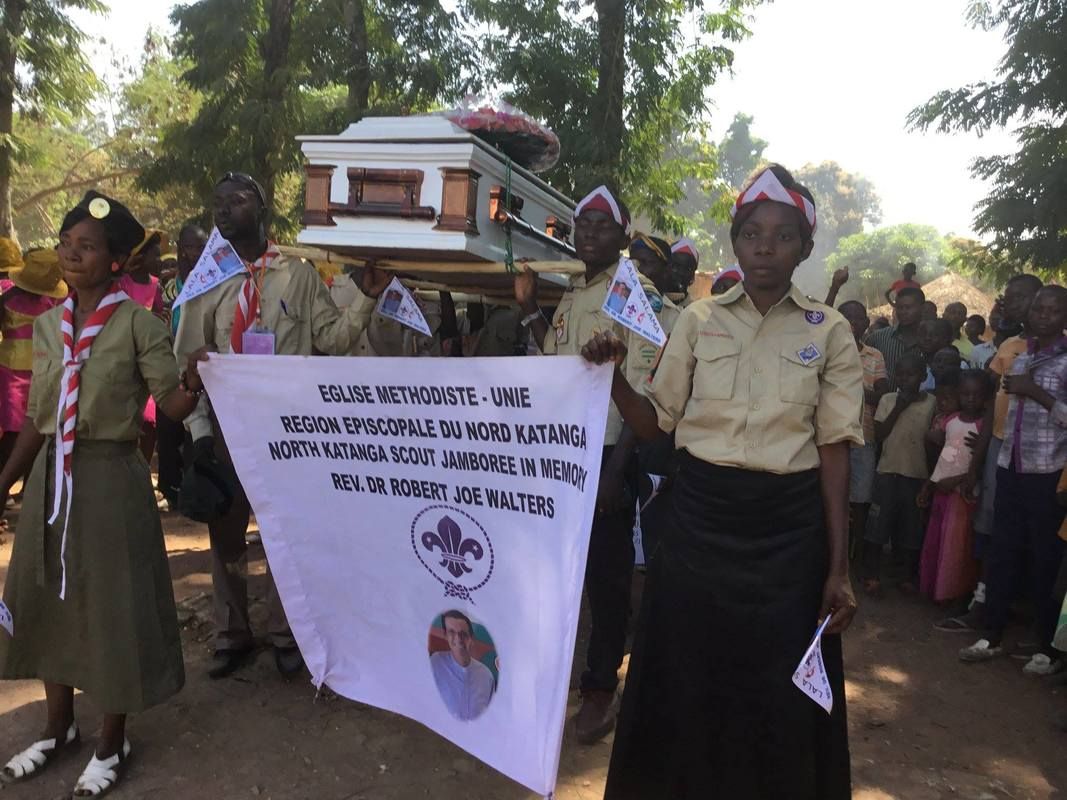|
by Rev. Lana Robyne, FPM Board Member
I felt incredibly blessed to join the delegation of eight clergywomen from North Katanga and Tanganyika to the African Methodist Clergywomen Leadership Development Conference* at Africa University in Zimbabwe. These clergy-sisters made sure I didn’t get lost, hungry, left behind, or separated from them at borders or bus transfers. We spent two nights on busses sharing food we’d brought and bought along the way. They helped make sure I didn’t leave behind any of my bags that I kept forgetting or misplacing. They took charge and insisted I get medical treatment when I twisted my ankle and scratched it on the bus door stepping off a bus in Lusaka, Zambia. They helped me hobble to the apothecary for medicine and made sure I kept it wrapped and elevated. One dear sister generously loaned me her pairs of sandals to replace my shoes as my ankle swelled. They made me think of all the sermons we had just heard from on abundant giving. This team of clergywomen never hesitated to freely share with each other from what few resources they had. When we arrived at AU after several days and nights, my sisters fully claimed me and counted me as one of their delegation. They continued to include me in everything they did. I claimed them too. Even though I had many old friends to catch up with from other conferences and students at AU, I was here first as a member of this delegation. It was quite a thrill to join in singing in several languages with over 300 clergywomen from all over the continent of Africa. On several occasions, clergy of our five Congolese episcopal areas spontaneously joined together in dancing and singing praise as people gathered in the chapel. We joined together with South Congo/Zambia to lead music for worship one day, and they insisted I join even though I was afraid I would not know the songs. I was glad they did, because I did know a couple of the songs, and enjoyed harmonizing even when I didn’t know the words. We also enjoyed joining with clergywomen from other Congolese conferences for a special banquet and dancing put on for us by the united Congolese students at AU. One special evening, each of the conference delegations processed together as they presented gifts and blessings to honor our first African woman bishop, the association’s outgoing president, Bishop Nhanala Joaquina from Mozambique. This conference was intensively informative with much to re-translate, digest and process. We heard powerful messages by Bishop Sharma D. Lewis from Virginia Conference. After one presentation by the COSROW representative, Dawn Wiggins Hare, we debriefed the COSROW report, confirming that the survey she asked everyone to fill out was about the sexual misconduct, discrimination, and abuse of women and girls, not about homosexuality. We tried to set aside time at the end of the evenings just for “us” North Katangans in one of our rooms to process Bible studies, talks, devotions, and key-note sermons, but a few nights we simply had to get some sleep. Poor Rev. Umba was kept up even later meeting with the other presidents of each conference. As we met and listened to other women’s life stories and prayers, it was clear many clergywomen around Africa have faced many similar struggles to North Katangans, and some have survived much worse discrimination and abuses. It was emotionally exhausting, but also affirming to be united in Christ. While the most complicated and confusing part of the conference was voting for the next quadrennium’s executive leaders for the African Clergywomen Association, it was also an important opportunity to come together to review and approve the group’s expectations of their conference and executive leaders. Some of the arguments and votes revealed how much colonialism continues to divide African women by languages, nations, and ethnic groups today, challenging the whole point of bringing African together to bond and support one another as sisters. Communications and translation certainly was a daunting challenge between clergywomen and between language groups. It also showed us how some clergywomen also seek to gain power over others, pushing down or disparaging others, blocking the advance of other clergywomen, and controlling access to information, travel opportunities, and financial resources for conferences like this. Women are unfortunately also equal to men in being tempted to misuse their position and power just as self-serving, corrupt clergymen do. Neither are all men corrupt and self-serving. I think the world of my North Katangan clergy-sisters. We bonded together as family. Several took turns translating for me. We grew close staying together in the residence halls, eating meals, sitting in worship together at AU. I appreciated how they fully included me as a member of our group while others regarded me as an outsider and visitor. During voting I had to step away from my group, and then I was asked to help count votes as an objective visitor. We did not sing or dance as we dragged ourselves out of bed very early the last morning. People were ushered onto busses as soon as they came out, so we did not even get to hug each other farewell. I stayed behind for a few days at AU before flying home from Harare. It was surreal to watch them leave without me, and I wonder if they felt like they had lost one member all the way home. We had become the nine women from North Katanga, not just eight and a guest. I myself went through the next few days feeling like I had misplaced eight sisters. My biggest regret is that we did not have more opportunity on the busses or more free time during the conference to share our stories and reflections. However, I have faith I will be back to North Katanga and Tanganyika to meet them again. In the meantime, I pray that they have plenty of opportunities to share their insights and learnings from the conference with everyone, male as well as female, young as well as old, poor as well as rich. Even though sexual misconduct, domestic violence, and rape still plague women and girls in the United States, Americans can hardly imagine what women here face just to survive and provide for their families. I have also met many good, secure men who are proud and supportive of the accomplishments, education, spiritual gifts, and talents of their wives, daughters, and mothers. * held July 10-14 organized and sponsored by the Association of African Clergywomen, the General Board of Higher Education, Central Conference Theological Education Fund, and COSROW.
0 Comments
by Rev. Lana Robyne, FPM Board Member
The mood was somber as a small group loaded onto the Wings of Morning. Bishop Mande and retired Bishop Ntambo were on the plane flown by Bishop Ntambo’s son, Gaston. The vice-governor and grand-chief of Mulongo were both on board. Several other important personages were given seats. We were headed to Mulongo for the final memorial service for missionary, pastor, author, founder of Friendly Planet Missiology, friend and colleague, Rev. Dr. Bob Walters. His widow, Teri, his daughter, Rev. Taylor Denyer, and Isaiah Robyne, my son, were the only other American passengers. As the plane revved up, we sadly waved to those left behind. Many had planned to be at the service. There was no way they could make it in time by moto or bicycles on the sandy, rutted roads, one unfortunate cost of conference running over another day. At least one came in the hopes that there might be room on the plane. There was not. It was surreal flying over some of the very roads Bob had bicycled. We circled over Mulongo about an hour after take-off from Kamina. We saw a shiny new building by the nursing school. Then we saw the crowds below, twenty people deep, probably more, lining the grassy runway on both sides for much of its length. It looked as if the entire population of Mulongo was there, approximately 100,000 adults not counting all their children. All the children seemed to be here too, hundreds of them of all ages. Older boys, scouts in tan uniforms, pushed them back to clear the path. Many children would not have remembered Bob. They were probably just excited about the plane, wanting to be part of the huge crowds, who the important visitors were, why so many people were waving flags with Bob’s smiling picture on them. After eulogies were given by Bishop Mande, Bishop Ntambo, and both the Vice-governor and Chief of the region, I was honored to preach my eulogy/sermon, and since I did not write out a copy, I am sharing part of the essence of it as I remember it here. It was a rather long sermon, so I am not including everything I said. “Baba” Bob passed away unexpectedly on July 31 last year, suffering a massive heart-attack while doing what he loved so much – bicycling near his home in Indiana. Since the moment I heard the news, I cried and worried what would become of FPM without him. I also immediately felt reassured by a vision of him setting out that day, bicycling along smooth roads, enjoying life as always, planning his next trip the North Katanga and the future of FPM. Then suddenly he is cycling up into the air, looking down in surprise to see his body and bike laying on the ground. But he knows where to go. First over his home to reassure his wife he is okay, then over his son Robbie’s home and on to Algiers over Taylor’s family. Then he cycles on to Congo, until he gets to North Katanga and Kalemie, circling over those who are weeping at the news, assuring them his mission will live on in them. Bob had a loving heart for serving God and the people of North Katanga, but he also had a bad heart, physically. After he died, the doctor who examined him was amazed. How could he have bicycled so much and so strongly? His heart was almost completely clogged. Bob should have died of a heart-attack ten years ago, he mused. Ten years ago? Think of that. Many of us did not know Bob ten years ago. That was about the time he returned to the DRC to ride his bicycle into war-ravaged areas he had served before being evacuated. That was about how long ago he became friends with Rev. Joseph Mulongo. I myself did not know him very well ten years ago. That was about the time he introduced me to his daughter Taylor. Over the past 10 years, Bob has inspired me in my missional theology, and kept encouraging Glen and me to bring students to bicycle in North Katanga with FPM. Two years ago we did that, but due to visa issues, Bob couldn’t join us. He made sure we were in good hands with Rev. D.S. Joseph Mulongo and watched over us from Indiana. We had begun planning on a second trip this year, about this time. We were looking forward to our group bicycling with him and learning from him this July. I never expected I would be returning to North Katanga with him for his memorial service. But I am assured he is with God, watching out for us and making sure we are all in good hands even when he can’t be with us in person. It is up to those of us left behind to carry on the mission of FPM. The mantle he left behind, unlike Elijah’s mantle for Elisha, cannot be carried by just one person. It will take all of us to share the responsibilities and carry on the spirit of listening to each other. Bob’s mission was not something only foreign missionaries could do. It is easy for all of us to listen and encourage each other, partner with each other to make our world a better place for widows, orphans, the poor and marginalized. The mantle we inherit is a servant’s robe. It is not like those who see clergy robes and stoles as signs of their authority and power to rule over the church and others, using money selfishly. It is a robe of Jesus Christ who turned his kingdom upside down to be a servant to others out of love, humility, justice, and compassion. by Rev. Lana Robyne, FPM Board Member
In the warm, tightly packed United Methodist conference center in Kamina, official reports had been going on all afternoon. Some eyelids drooped and a few heads nodded in the post-lunch slump. At least I’ll admit mine were. Other people were sitting up as straight as they could on the long wooden benches and fanning themselves with papers from that day – a bulletin from morning worship or the conference agenda with the stapled pages folded over to reveal how far behind on the schedule we’d fallen. Some were undoubtedly fanning themselves with their tightly clutched revised copy of Amendment 1. We were all anxious about the outcome of our lengthy debate over the issue of gender equality. Delegates were already predicting the three-day conference would probably be extended another day. That is not uncommon, but the prospect especially worried those hoping to travel to Mulongo for the memorial service of the Rev. Dr. Bob Walters. It also worried the eight clergywomen who were scheduled to fly to Lubumbashi as soon as the plane returned from Mulongo so they could make it to Africa University in time for the African Clergywomen’s Leadership Conference. Then an announcement was made. Suddenly, elated ululating broke forth among the tense crowd and a voice called out singing with great confidence. Euphoric United Methodist women in their green print uniforms with yellow scarves practically jumped up from their seats and joined in singing. Clergy wives and female lay representatives harmonized as they excitedly excused their way down the crowded rows toward the aisles. Clergywomen clapped and sang along with the joyous song as they danced toward their sisters in the center of the church. A few shy female youth delegates at the back and some visiting choir members soon joined in. A good number of men were grinning and clapping with the women. The excitement was infectious! The only thing is, not having a translator at the time, I was quite confused. When someone came out of the ecstatic crowd and pulled me to join the dance. “What happened?” I practically had to shout. “It passed!” the person yelled back into my ear. Amendment 1 had passed! Now my heart soared with all these women and this conference. I admit it took a moment to sink in. I have visited many of my Methodist brothers and sisters in the DRC as well as Zambia and Zimbabwe since being a visiting chaplain at Africa University for a semester in 2006. I have also been blessed to spend time with amazing church leaders who value and empower women clergy. I have been impressed by the creative, determined, and effective female clergy I have met. At the same time, I have heard personal testimonies of intense resistance to girls and women’s education, pressure for girls to marry and start a family too young, challenges for widows and women abandoned by husbands trying to provide for families, gender discrimination for women in ministry and other jobs, and sexual misconduct girls and women face. I have read many reports about systemic rape and sexual abuse in Congo, not just in war zones but in homes, schools, orphanages, and even churches by trusted adults. Thus, I had not dared to get up much hope in Amendment 1 (theologically affirming gender equality). Nor was it obvious which way the vote would go since another version of Amendment 1 had been unanimously defeated here the year before. Each conference had to debate and vote again on the corrected version that focused only on gender discrimination for girls and women, not the gender of God. After an explanation of all this by Bishop Mande, a government dignitary confirmed that this amendment did not break any Congolese laws, and there was opportunity for three speeches for and against. Speeches against the amendment included one man’s argument that Eve was created secondarily from Adam’s rib. Another clergywoman argued both men and women are created equally in God’s image. From the tension in the room, I am not sure anyone had a clear prediction about the results. So, it was all the more exciting and affirming for women that this version of Amendment 1 had not only successfully passed this time, but passed overwhelmingly by the North Katanga Annual Conference, male and female, clergy and lay, young and old. The FPM blog will soon be returning with a new writing team and new look. To access our original blog with stories primarily written by our late co-founder, the Rev. Dr. "Biking Bob" Walters, click here.
|
- HOME
- ABOUT US
- OUR BOOKS
-
OUR WORK
-
HISTORY
>
- 2023 YEAR IN REVIEW
- 2022 YEAR IN REVIEW
- 2021 YEAR IN REVIEW
- 2020 YEAR IN REVIEW
- 2019 YEAR IN REVIEW
- 2018 YEAR IN REVIEW
- 2017 Year in Review
- 2016 Year in Review
- 2015 Year in Review
- 2014 Year in Review
- 2013 Year in Review
- 2012 Year in Review >
- 2011 Year in Review >
- 2010 Year in Review >
- 2009 Year in Review
- NURSING SCHOOL
- WOMEN'S FOYER
-
HISTORY
>
- DONATE
- BLOG
- CONTACT US



 RSS Feed
RSS Feed